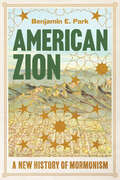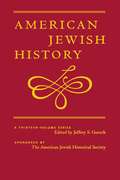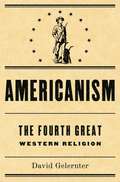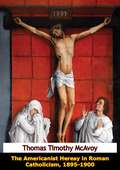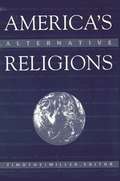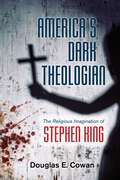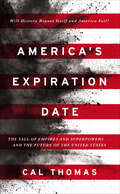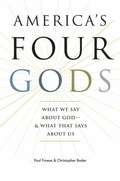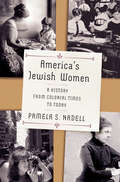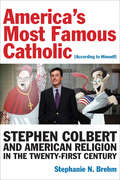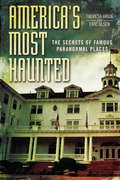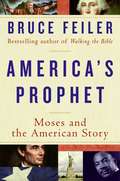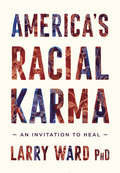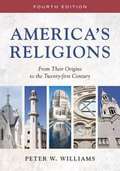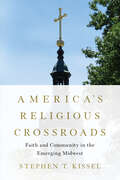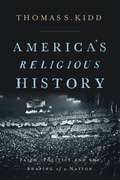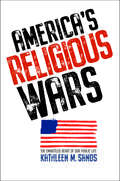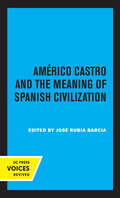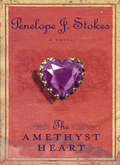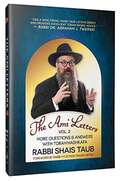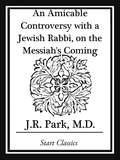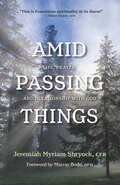- Table View
- List View
American Zion: A New History of Mormonism
by Benjamin E. ParkNew Yorker — "The Best Books We’ve Read in 2024 So Far" The first major history of Mormonism in a decade, drawing on newly available sources to reveal a profoundly divided faith that has nevertheless shaped the nation. The Church of Jesus Christ of Latter-day Saints was founded by Joseph Smith in 1830 in the so-called “burned-over district” of upstate New York, which was producing seers and prophets daily. Most of the new creeds flamed out; Smith’s would endure, becoming the most significant homegrown religion in American history. How Mormonism succeeded is the story told by historian Benjamin E. Park in American Zion. Drawing on sources that have become available only in the last two decades, Park presents a fresh, sweeping account of the Latter-day Saints: from the flight to Utah Territory in 1847 to the public renunciation of polygamy in 1890; from the Mormon leadership’s forging of an alliance with the Republican Party in the wake of the New Deal to the “Mormon moment” of 2012, which saw the premiere of The Book of Mormon musical and the presidential candidacy of Mitt Romney; and beyond. In the twentieth century, Park shows, Mormons began to move ever closer to the center of American life, shaping culture, politics, and law along the way. But Park’s epic isn’t rooted in triumphalism. It turns out that the image of complete obedience to a single, earthly prophet—an image spread by Mormons and non-Mormons alike—is misleading. In fact, Mormonism has always been defined by internal conflict. Joseph Smith’s wife, Emma, inaugurated a legacy of feminist agitation over gender roles. Black believers petitioned for belonging even after a racial policy was instituted in the 1850s that barred them from priesthood ordination and temple ordinances (a restriction that remained in place until 1978). Indigenous and Hispanic saints—the latter represent a large portion of new converts today—have likewise labored to exist within a community that long called them “Lamanites,” a term that reflected White-centered theologies. Today, battles over sexuality and gender have riven the Church anew, as gay and trans saints have launched their own fight for acceptance. A definitive, character-driven work of history, American Zion is essential to any understanding of the Mormon past, present, and future. But its lessons extend beyond the faith: as Park puts it, the Mormon story is the American story.
American Zionism: American Jewish History (American Jewish History)
by Jeffrey S. GurockFirst Published in 1998. Routledge is an imprint of Taylor & Francis, an informa company.
Americanism: The Fourth Great Western Religion
by David GelernterWhat does it mean to "believe" in America? Why do we always speak of our country as having a mission or purpose that is higher than other nations? Modern liberals have invested a great deal in the notion that America was founded as a secular state, with religion relegated to the private sphere. David Gelernter argues that America is not secular at all, but a powerful religious idea--indeed, a religion in its own right. Gelernter argues that what we have come to call "Americanism" is in fact a secular version of Zionism. Not the Zionism of the ancient Hebrews, but that of the Puritan founders who saw themselves as the new children of Israel, creating a new Jerusalem in a new world. Their faith-based ideals of liberty, equality, and democratic governance had a greater influence on the nation's founders than the Enlightenment. Gelernter traces the development of the American religion from its roots in the Puritan Zionism of seventeenth-century New England to the idealistic fighting faith it has become, a militant creed dedicated to spreading freedom around the world. The central figures in this process were Abraham Lincoln, Teddy Roosevelt, and Woodrow Wilson, who presided over the secularization of the American Zionist idea into the form we now know as Americanism. If America is a religion, it is a religion without a god, and it is a global religion. People who believe in America live all over the world. Its adherents have included oppressed and freedom-loving peoples everywhere--from the patriots of the Greek and Hungarian revolutions to the martyred Chinese dissidents of Tiananmen Square. Gelernter also shows that anti-Americanism, particularly the virulent kind that is found today in Europe, is a reaction against this religious conception of America on the part of those who adhere to a rival religion of pacifism and appeasement. A startlingly original argument about the religious meaning of America and why it is loved--and hated--with so much passion at home and abroad.
The Americanist Heresy in Roman Catholicism, 1895-1900
by Thomas Timothy McAvoyAs America entered the twentieth century, a difficult question confronted the rapidly-growing Catholic Church: To what degree, if any, should religious practices be adapted to the American milieu?The Catholic hierarchy of the United States in these years was sharply divided between conservatives and “Americanists.” The former group believed that republican governments were, per se, opposed to religion. The “Americanists,” on the other hand, not only saw democracy as the best possible government for a pluralistic society such as obtained in this nation, but were convinced that a pragmatic approach to cultural problems was an absolute necessity.The controversy and its resolution, as here unfolded by Reverend Thomas T. McAvoy, C.S.C., provide rich material for a fascinating and hitherto little-studied piece of history. Father McAvoy, formerly Head of the Department of History at the University of Notre Dame, now functions as University Archivist while continuing on the History faculty.
America's Alternative Religions (SUNY Series in Religious Studies)
by Timothy MillerThis is a single-volume source of reliable information on the most important alternative religions, covering for each such essentials as history, theology, impact on the culture, and current status. The chapters of the book were written by experts who study the movements they have written about.
America's Dark Theologian: The Religious Imagination of Stephen King
by Douglas E. CowanIlluminating the religious and existential themes in Stephen King’s horror stories Who are we? Why are we here? Where do we go when we die? For answers to these questions, people often look to religion. But religion is not the only place seekers turn. Myths, legends, and other stories have given us alternative ways to address the fundamental quandaries of existence. Horror stories, in particular, with their focus on questions of violence and mortality, speak urgently to the primal fears embedded in such existential mysteries. With more than fifty novels to his name, and hundreds of millions of copies sold, few writers have spent more time contemplating those fears than Stephen King. Yet despite being one of the most widely read authors of all time, King is woefully understudied. America’s Dark Theologian is the first in-depth investigation into how King treats religion in his horror fiction. Considering works such as Carrie, The Dead Zone, Misery, The Shining, and many more, Douglas Cowan explores the religious imagery, themes, characters, and, most importantly, questions that haunt Stephen King’s horror stories. Religion and its trappings are found throughout King’s fiction, but what Cowan reveals is a writer skeptical of the certainty of religious belief. Describing himself as a “fallen away” Methodist, King is less concerned with providing answers to our questions, than constantly challenging both those who claim to have answers and the answers they proclaim. Whether he is pondering the existence of other worlds, exploring the origins of religious belief and how it is passed on, probing the nature of the religious experience, or contemplating the existence of God, King invites us to question everything we think we know.
America's Expiration Date: The Fall of Empires and Superpowers . . . and the Future of the United States
by Cal ThomasA warning and a wake-up call to learn history so we are not doomed to repeat it. A must-read for anyone who longs for a promising future for our great nation.What is wrong with America today? Is it possible that America could crumble and our democracy fail?Questions like these plague Americans and cause us to be anxious about the future of the "land that we love." Individuals may come to different conclusions, but there seems to be a common thread - the deep-seated feeling that we need to improve our country. Our culture is increasingly immoral, the family structure is threatened from all sides, and government programs consistently overreach, creating massive debt.In this powerful and prophetic book, nationally syndicated columnist and trusted political commentator Cal Thomas offers a diagnosis of what exactly is wrong with the United States by drawing parallels to once-great empires and nations that declined into oblivion. Citing the historically proven 250-year pattern of how superpowers rise and fall, he predicts that America's expiration date is just around the corner and shows us how to escape their fate.Through biblical insights and hard-hitting truth, he reminds us that real change comes when America looks to God instead of Washington. Scripture, rather than politics, is the GPS he uses to point readers to the right road - a road of hope, life, and change. Because, he says, if we're willing to seek God first, learn from history, and make changes at the individual and community level, we can not only survive, but thrive, again.This powerful, timely, and much-needed perspective is a must-read for anyone who longs for a promising future for our great nation.
America's Four Gods: What We Say about God -- And What That Says about Us
by Paul Froese Christopher BaderThis text draws on the most wide-ranging, comprehensive, and illuminating survey of American's religious beliefs ever conducted to offer a systematic exploration of how Americans view God.
America's Jewish Women: A History From Colonial Times To Today
by Pamela NadellA groundbreaking history of how Jewish women maintained their identity and influenced social activism as they wrote themselves into American history. What does it mean to be a Jewish woman in America? In a gripping historical narrative, Pamela S. Nadell weaves together the stories of a diverse group of extraordinary people—from the colonial-era matriarch Grace Nathan and her great-granddaughter, poet Emma Lazarus, to labor organizer Bessie Hillman and the great justice Ruth Bader Ginsburg, to scores of other activists, workers, wives, and mothers who helped carve out a Jewish American identity. The twin threads binding these women together, she argues, are a strong sense of self and a resolute commitment to making the world a better place. Nadell recounts how Jewish women have been at the forefront of causes for centuries, fighting for suffrage, trade unions, civil rights, and feminism, and hoisting banners for Jewish rights around the world. Informed by shared values of America’s founding and Jewish identity, these women’s lives have left deep footprints in the history of the nation they call home.
America’s Last Call: On the Brink of a Financial Holocaust
by David Wilkerson(Quoted from the Author) "A majority of Americans have concluded, 'Morals do not count. Let our leaders do as they please; just give us a booming economy!' God is about to crush this abominable American mindset. Soon the American dream will become the American nightmare. Yet through it all, those who know God can be assured of constant protection and provision from His hands." Even though Wilkerson published his book in 1998, his predictions about the U.S. economy are surprisingly accurate. and therefore, are worth investigating.
America’s Most Famous Catholic: Stephen Colbert and American Religion in the Twenty-First Century (Catholic Practice In North America Ser.)
by Stephanie N. BrehmFor nine years, Stephen Colbert’s persona, “Colbert”—a Republican superhero and parody of conservative political pundits—informed audiences on current events, politics, social issues, and religion while lampooning conservative political policy, biblical literalism, and religious hypocrisy. As devout, vocal, and authoritative lay Catholics, religion is central to both the actor and his most famous character. Yet many viewers wonder, “Is Colbert a practicing Catholic in real life or is this part of his act?” America’s Most Famous Catholic (According to Himself) examines the ways in which Colbert challenges perceptions of Catholicism and Catholic mores through his faith and comedy.Religion and the foibles of religious institutions have served as rich fodder for scores of comedians over the years. What set “Colbert” apart on his Comedy Central show, The Colbert Report, was that his critical observations were made more powerful and harder to ignore because he approached religious material not from the predictable stance of the irreverent secular comedian but from his position as one of the faithful. He is a Catholic celebrity who can bridge critical outsider and participating insider, neither fully reverent nor fully irreverent.Providing a digital media ethnography and rhetorical analysis of Stephen Colbert and his character from 2005 to 2014, author Stephanie N. Brehm examines the intersection between lived religion and mass media, moving from an exploration of how Catholicism shapes Colbert’s life and world toward a conversation about how “Colbert” shapes Catholicism. Brehm provides historical context by discovering how “Colbert” compares to other Catholic figures, such Don Novello, George Carlin, Louis C.K., and Jim Gaffigan, who have each presented their views of Catholicism to Americans through radio, film, and television. The last chapter provides a current glimpse of Colbert on The Late Show, where he continues to be a voice for Catholicism on late night, now to an even broader audience.America’s Most Famous Catholic (According to Himself) also explores how Colbert carved space for Americans who currently define their religious lives through absence, ambivalence, and alternatives. Brehm reflects on the complexity of contemporary American Catholicism as it is lived today in the often-ignored form of Catholic multiplicity: thinking Catholics, cultural Catholics, cafeteria Catholics, and lukewarm Catholics, or what others have called Colbert Catholicism, an emphasis on the joy of religion in concert with the suffering. By examining the humor in religion, Brehm allows us to see clearly the religious elements in the work and life of comedian Stephen Colbert.
America's Most Haunted
by Theresa Argie Eric OlsenThroughout the United States, there are places haunted by souls both malevolent and benign. Places where paranormal activity runs rampant. Places where we can glimpse the other side... In America's Most Haunted, "Haunted Housewife" investigator Theresa Argie and journalist Eric Olsen team up to take you on a first-person tour of some of America's most active paranormal hotspots. Experience the crawl through the death tunnel where visitors have reported sightings of an inhuman creature that creeps along the walls and ceilings. Walk the decks of the Queen Mary with the hundreds of souls that met their ends in watery graves. And get to know the spirits that wait in jails, mansions, lunatic asylums, and even a stately old hotel. Combining spine-tingling stories, documented evidence, and interviews with some of the top names in paranormal investigation--including the stars of TV's "Ghost Hunters," "Ghost Adventures," and more--America's Most Haunted gives you a terrifying chance to tour our nation's most famous haunted places. Are you brave enough to take a look?
America's Pastor
by Grant WackerMore than a conventional biography, Grant Wacker's interpretive study deepens our understanding of why Billy Graham has mattered so much to so many, and how his uncanny ability to appropriate trends in the wider culture allowed him to transform his born-again theology into a moral vocabulary capturing the aspirations and fears of average Americans.
America's Prophet
by Bruce FeilerThe exodus story is America's story. Moses is our real founding father. The pilgrims quoted his story. Franklin and Jefferson proposed he appear on the U.S. seal. Washington and Lincoln were called his incarnations. The Statue of Liberty and Superman were molded in his image. Martin Luther King, Jr., invoked him the night before he died. Ronald Reagan and Barack Obama cited him as inspiration. For four hundred years, one figure inspired more Americans than any other. His name is Moses. In this groundbreaking book, New York Times bestselling author Bruce Feiler travels through touchstones in American history and traces the biblical prophet's influence from the Mayflower through today. He visits the island where the pilgrims spent their first Sabbath, climbs the bell tower where the Liberty Bell was inscribed with a quote from Moses, retraces the Underground Railroad where "Go Down, Moses" was the national anthem of slaves, and dons the robe Charlton Heston wore in The Ten Commandments. "Even a cursory review of American history indicates that Moses has emboldened leaders of all stripes," Feiler writes, "patriot and loyalist, slave and master, Jew and Christian. Could the persistence of his story serve as a reminder of our shared national values? Could he serve as a unifying force in a disunifying time? If Moses could split the Red Sea, could he unsplit America?" One part adventure story, one part literary detective story, one part exploration of faith in contemporary life, America's Prophet takes readers through the landmarks of America's narrative--from Gettysburg to Selma, the Silver Screen to the Oval Office--to understand how Moses has shaped the nation's character. Meticulously researched and highly readable, America's Prophet is a thrilling, original work of history that will forever change how we view America, our faith, and our future.
America's Racial Karma: An Invitation to Heal
by Larry WardImmediate, illuminating, and hopeful: this is the key set of talks given by leading Zen Buddhist teacher Larry Ward, PhD, on breaking America's cycle of racial trauma."I am a drop in the ocean, but I'm also the ocean. I'm a drop in America, but I'm also America. Every pain, every confusion, every good and every bad and ugly of America is in me. And as I transform myself and heal and take care of myself, I'm very conscious that I'm healing and transforming and taking care of America. I say this for American cynics, but this is also true globally. It's for real." So says Zen Buddhist teacher Dr. Larry Ward.Shot at by the police as an 11-year-old child for playing baseball in the wrong spot, as an adult, Larry Ward experienced the trauma of having his home firebombed by racists. At Plum Village Monastery in France, the home in exile of his teacher, Vietnamese peace activist and Zen teacher Thich Nhat Hanh, Dr. Ward found a way to heal. In these short reflective essays, he offers his insights on the effects of racial constructs and answers the question: how do we free ourselves from our repeated cycles of anger, denial, bitterness, pain, fear, violence? Larry Ward looks at the causes and conditions that have led us to our current state and finds, hidden in the crisis, a profound opportunity to reinvent what it means to be a human being. This is an invitation to transform America's racial karma.
America's Religions: From Their Origins to the Twenty-first Century (3rd edition)
by Peter W. WilliamsIn this comprehensive survey, Williams offers concise descriptions of the background, beliefs, practices, and leaders of America's most influential and distinctive religious movements and denominations. Thoroughly revised and updated, this third edition of America's Religions incorporates the latest scholarship on religion and considers timely issues such as status of Muslims in the United States after September 11, 2001; the impact of religion on American politics, especially concerning the emergence of the Religious Right; and the intense battles fought within the Catholic Church and other denominations over the status of gay marriage and accusations of clergy members' sexual abuse. This edition also includes thirty-eight new illustrations of key persons in American religious history and notable places of worship.
America's Religious Crossroads: Faith and Community in the Emerging Midwest
by Stephen T. KisselBetween 1790 and 1850, waves of Anglo-Americans, African Americans, and European immigrants flooded the Old Northwest (modern-day Ohio, Indiana, Michigan, Illinois, and Wisconsin). They brought with them a mosaic of Christian religious belief. Stephen T. Kissel draws on a wealth of primary sources to examine the foundational role that organized religion played in shaping the social, cultural, and civic infrastructure of the region. As he shows, believers from both traditional denominations and religious utopian societies found fertile ground for religious unity and fervor. Able to influence settlement from the earliest days, organized religion integrated faith into local townscapes and civic identity while facilitating many of the Old Northwest's earliest advances in literacy, charitable public outreach, formal education, and social reform. Kissel also unearths fascinating stories of how faith influenced the bonds, networks, and relationships that allowed isolated western settlements to grow and evolve a distinct regional identity. Insightful and broad in scope, America’s Religious Crossroads illuminates the integral relationship between communal and spiritual growth in early Midwestern history.
America's Religious History: Faith, Politics, and the Shaping of a Nation
by Thomas S. KiddIn the post-9/11 world, it is not difficult to see how important religion remains in America and around the globe. An older generation of scholars expected that America and the rest of the Western world was headed inexorably toward secularization and the end of religion. America is undoubtedly secular in many ways, and our constitutional order requires a clear distinction between faith communities and government. Yet from the colonial era to the present, American men and women have been, and have remained, a pervasively religious people.In America's Religious History, leading historian Thomas S. Kidd traces the theological and ethnic diversity and enduring strength of American religion, with special attention to Christianity and evangelical faith. Interweaving religious history and key events from the larger narrative of American history, the book considers how faith commitments and categories have shaped the nation.Written with the student in mind, America's Religious History offers an up-to-date, narrative introduction useful for undergraduate and graduate-level courses on American religion. General readers wanting to better understand the religious background of American life and politics will also enjoy its engaging and insightful overview.
America’s Religious Wars: The Embattled Heart of Our Public Life
by Kathleen M. SandsHow American conflicts about religion have always symbolized our foundational political values When Americans fight about “religion,” we are also fighting about our conflicting identities, interests, and commitments. Religion-talk has been a ready vehicle for these conflicts because it is built on enduring contradictions within our core political values. The Constitution treats religion as something to be confined behind a wall, but in public communications, the Framers treated religion as the foundation of the American republic. Ever since, Americans have translated disagreements on many other issues into an endless debate about the role of religion in our public life. Built around a set of compelling narratives—George Washington’s battle with Quaker pacifists; the fight of Mormons and Catholics for equality with Protestants; Teddy Roosevelt’s concept of land versus the Lakota’s concept; the creation-evolution controversy; and the struggle over sexuality—this book shows how religion, throughout American history, has symbolized, but never resolved, our deepest political questions.
Americo Castro and the Meaning of Spanish Civilization
by José Rubia BarciaThis title is part of UC Press's Voices Revived program, which commemorates University of California Press’s mission to seek out and cultivate the brightest minds and give them voice, reach, and impact. Drawing on a backlist dating to 1893, Voices Revived makes high-quality, peer-reviewed scholarship accessible once again using print-on-demand technology. This title was originally published in 1976.
The Amethyst Heart
by Penelope StokesThe only possession Miss Amethyst Noble loves as much as the antique brooch she wears at her throat is Noble House-a symbol of freedom, faith, and a family history proudly and inextricably entwined with the history of a nation. For a hundred and forty years, Noble House has been a place of shelter, hope, and healing in Cambridge, Mississippi. A place of miracles.When she discovers her dissolute son has designs to sell the ancestral home out from under her, Miss Amethyst-ninety-three years old and as sharp as eve- isn't about to let that legacy go. If her son is lost to her, there's still her granddaughter. Little Am, who had once held such sweet promise, but the gentle, good-natured child has mutated in her teenage years into something else altogether. But whatever it takes, Little Am is going to know that the Noble family heritage is worth fighting for.
The Ami Letters (Questions and Answers With Torah Hashkafa #2)
by Rabbi Shais TaubAppearing in the pages of Ami Magazine for over seven years, “Ask Rabbi Shais Taub” has gained a wide and dedicated following who return weekly seeking his astute guidance, clarity, inspiration, and deep faith. Rabbi Taub’s trademark style of answering the questioner and not just the question has been praised for its sharp ability to dissect and analyze the readers’ questions as well as its compassion and empathy. Much more than just an advice column, “Ask Rabbi Shais Taub” has become a trusted source for penetrating insights on life, based firmly upon authentic Torah values. <p><p>Includes over 70 questions and answers covering real-life issues in the areas of Faith and Belief, Emotional Well-Being, Friends and Community, Family Matters, Kibbud Av Va’Eim - Honoring Parents, Work, and Finances!
An Amicable Controversy with a Jewish Rabbi, on the Messiah's Coming
by J. R. Park"The testimony of Jesus in the spirit of prophecy." Few, perhaps, of those who read the Scriptures are fully aware of the extent to which the language of them abounds in metaphor; yet is this knowledge indispensable to the right understanding of both the Old and the New Testament, and especially the prophetic parts of these books. If Christ be the Messiah, his kingdom is a spiritual one, and what relates to it must be spiritually understood. We marvel at the blindness which prevents the Jews from perceiving in prophecy the numerous intimations of a spiritual Messiah, all of which appear to us to have been distinctly fulfilled in the person of Christ; and yet that very blindness to their spirituality is what prevents ourselves from understanding other prophecies relating to the same subject. The happy state which the world may attain to, under the universal prevalence of true religion, it is more easy to imagine, than to describe; for a volume would hardly suffice to enumerate all the blessings it is calculated to afford. The cessation of foreign war, with all the miseries attending it; the end of all tyranny and oppression at home; of injustice and misrule, are the most distinctly announced, and their benefit perhaps the most obvious. But their influence on society is limited in comparison with the wide diffusion of happiness that would ensue from the improvement in private life, and the amelioration of individual character.
Amid Passing Things: Life, Prayer, and Relationship with God
by Murray Bodo Jeremiah Myriam ShryockAmid Passing Things is a collection of meditations on all the ways God enters our lives, even when we're unaware. Based on his own life experiences, Franciscan friar Jeremiah Shryock offers both struggles and joys that come in a life that's consciously encountering God—the Holy One all around us—not in some far-off place, but right here and now in this life, amid passing things.
